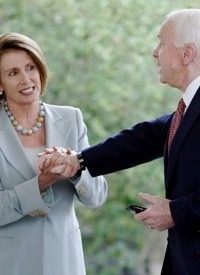
Eight years after the war in Afghanistan began on October 7, 2001, in response to the September 11 attacks, President Obama is busy consulting with his national security team to assess our presence there.
Operation Enduring Freedom — as the initial force was called — was widened by the creation of the International Security Assistance Force (ISAF) established by the UN Security Council at the end of December 2001, and which was taken over by NATO in 2003.
The 90-minute meeting in the White House State Dining Room on October 6 by House and Senate members from both parties — including Speaker of the House Nancy Pelosi and former GOP presidential candidate Sen. John McCain — was one of the latest in a series of recent meetings conducted to help President Obama formulate his war policy in Afghanistan.
An AP report quoted Senate Majority Leader Harry Reid, who said that both Democrats and Republicans told the President, in effect: "Whatever decision you make, we’ll support it."
Another attendee at the meeting, House Republican leader John Boehner, told the press: "We do recognize that he has a tough decision, and he wants ample time to make a good decision. Frankly, I support that, but we need to remember that every day that goes by, the troops that we do have there are in greater danger."
During a press briefing held at the White House on October 6 conducted by Press Secretary Robert Gibbs, reporters’ questions about Afghanistan dominated the session.
A sampling of some these includes:
Q: The President said at the Counterterrorism Center today, "We’re making real progress in our core mission to disrupt, dismantle and defeat al Qaeda and other extremist networks" — which is almost exactly what he said, as you know, back in March, when he announced the Afghanistan-Pakistan strategy. So I’m wondering, is this strategy review that’s going on at all looking at what the mission is, why the U.S. is still in Afghanistan? Or is he saying the mission is clear, it’s just a matter of how we go about it that’s under review?
MR. GIBBS: Well, look, we talked yesterday and I said, I think pretty clearly, that leaving Afghanistan isn’t an option. What the President laid out in March, as you mentioned, was a strategy that is focused not just on Afghanistan but also on Pakistan. We know and are first and foremost the President’s — what’s on the President’s mind are those that attacked us on September 11, 2001; those that have through the global network of al-Qaeda have the intent and are actively planning to do so again.
All of that is part of what is being evaluated — where we are, the progress that has been made in dealing with those different entities and the groups that are involved. All of that is going into — and I think tomorrow’s [October 7] meeting focuses I think almost primarily on Pakistan.
Q: When you say all that is being looked at, is the mission itself set and consistent, or is that being debated?
MR. GIBBS: The mission of disrupting, dismantling and ultimately destroying al-Qaeda and its extremist allies, that’s the focus of why we’re there and what we’re trying to accomplish. And I think — I think the President used today’s important visit to highlight the role that many individuals play in coordinating intelligence that we get here in the United States that helped to disrupt potential attacks as we’ve seen over the past many weeks.
Q: Can you elaborate a bit about what the President wants to accomplish specifically with the meeting with lawmakers today?
MR. GIBBS: Yes, I think the meeting will start off with the President laying out where we are in the review and the process moving forward, and open it up to a Q&A with members of Congress. I think you all have a list of those that have been invited.
Look, obviously the President, as I’ve said repeatedly and he has, too, the President has and wants to hear from all of those that are involved in decisions about protecting our homeland, keeping our country safe, as well as the deployment of our men and women in uniform. And obviously Congress plays an important and significant role in that, and this is part of talking to them about this process.
Q: Just one follow on that. Is that a process that the President thinks did not happen adequately under President Bush with the war in Iraq — is this something he’s trying to change?
MR. GIBBS: Which — bringing Congress in?
Q: Bringing Congress in — and listening.
MR. GIBBS: Well, hard for me to grade that. I know that the President believes it’s — this President believes it’s tremendously important to seek that input, Democrat and Republican, House and Senate, as we move forward. And that’s the intent of the meeting today.
Q: Just more on the meeting. I’m wondering if you can talk about what the role he sees for Congress in this. President Bush definitely saw the executive branch as having a lead role in deciding how many troops were going, and he would consult with Congress. Does President Obama take a different approach?
MR. GIBBS: Well, look, I mean, obviously there are different roles. One is the role of Commander-in-Chief. Another, obviously, though, is the role of — through the appropriations process, particularly, in the resources that are needed to move forward. I think, obviously, that’s an extremely important role. You can’t do one without the other. And that’s, I think, what — part of what we’ll — I doubt they’ll get into specific appropriations, but the strategy that would ultimately surround the need for resources from Congress.
Q: There is growing skepticism, as you know, among many Democrats about a troop increase for Afghanistan. How important is that going to be in his decision-making process?
MR. GIBBS: Well, again, as I’ve said, the President hopes to and will hear from many across the political spectrum throughout this process. The decision he makes will be what he believes is in the best interest of this country and those that serve in uniform in protecting us. This is not a political debate or a political argument.
Q: Okay, and just one follow-up on your comment, "Leaving Afghanistan is not an option." Is reducing the number of troops an option? How wide….
MR. GIBBS: Well, I’m not going to get into — I think there’s been this notion about — whether there was a debate about everybody going home. As late as this weekend there were questions about that on some of the news shows. I think it’s important to dispense with, as the President did in the very beginning of our second meeting last week in the Situation Room, with that notion.
***
It is telling that when asked about what the role President Obama sees for Congress with regard to the war, Gibbs answered, “Obviously there are different roles. One is the [President’s] role of Commander-in-Chief. Another, obviously, though, is the [congressional] role of — through the appropriations process, particularly, in the resources that are needed to move forward.”
However, Gibbs did not mention the most important role of Congress in any war, the role assigned to it Article I, Section 8 of the Constitution: “To declare war, grant letters of marque and reprisal…”
This omission is by no means unique to the Obama administration, and has characterized most Presidents since Harry Truman, so apparently the precedent has by now been so well established it requires no explanation. Instead of going to Congress for a declaration of war, Presidents now seek authorization from the UN, our Constitution notwithstanding.
One reason post-World War II Presidents may have avoided Congress so consistently is that following two deadly world wars, war ceased to be a very popular option. Which was one reason the internationalists who founded the UN were finally able to gain senatorial approval for U.S. membership in the United Nations — an exercise that had failed miserably when President Woodrow Wilson attempted to herd the United States into the League of Nations after the first World War.
Ironically, instead of being an instrument for peace, the UN has afforded U.S. presidents with a way to go to war without a congressional declaration. Consequently, U.S. participation in wars has increased in frequency and duration since the establishment of the UN.
That the public is becoming war-weary is evident. An AP report of October 7 noted that “support for the war now stands at 40 percent, down from 44 percent in July, according to a new Associated Press-GfK poll. A total of 69 percent of self-described Republicans in the poll favor sending more troops, while 57 percent of self-described Democrats oppose it.”
It appears that our supposedly conservative Republican party needs to engage in more education about conserving our Constitution. That may be one reason that many Americans who formerly called themselves “conservatives” now prefer the term “constitutionalists.”
Photo of Rep. Pelosi and Sen. McCain: AP Images

